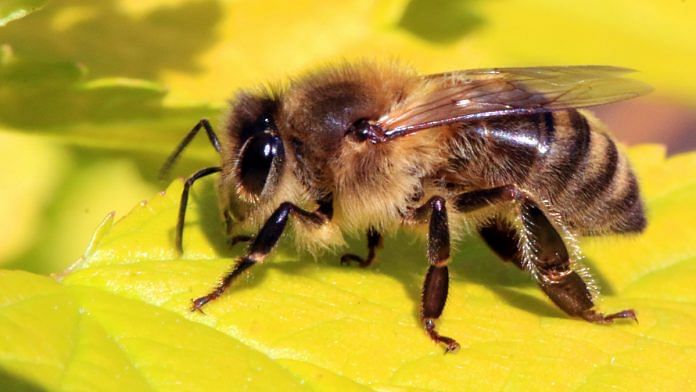When you think of a bee, what are the first images and sounds that come to mind? Fuzzy yellow; black stripes; little antennas; and a humming buzz. The bee you’re probably thinking of is the honeybee—one of thousands of species of bees that has become the sort of “poster bee” for environmentalists.
It’s charismatic, it’s cute. But while honeybees are an integral part of our agricultural economy, the majority of pollination for most crops and flowers is actually done by other insects, Dave Goulson, a biology professor at the University of Sussex, says.
Goulson says there’s a huge amount of public misunderstanding surrounding bees. By focusing too much on honeybees, we risk ignoring certain problems faced by all the other bees, he says.
Also read: How bees are boosting the fortunes of Indian farmers
Honeybees are essentially livestock, Goulson says. They’re kept in manmade structures where they’re given food and medicine, and then they’re deployed by the millions to perform a specific agriculture function. All that special treatment makes them a poor symbol for the environmental problems faced by the many other species of bee, he says.
“I get really frustrated when people talk about ‘the bee,’” Goulson says. “They’re usually talking about honeybees, or maybe they’re just talking about bees and they don’t realize there’s more than one species.”
Of course, all bees still benefit from the media attention and subsequent public awareness honeybees received in 2006 because of colony collapse disorder, Mace Vaughn, who co-directs the Pollinator Program at the Xerces Society for Invertebrate Conservation, says,
“That was an important moment for pollinator conservation overall,” Vaughn says. “So in that sense, you can thank the honeybees as an important messenger.”
But there are plenty of candidates just as charismatic and as cute as the honeybee, says Paige Embry, a freelance writer and author of the book “Our Native Bees: North America’s Endangered Pollinators and the Fight to Save Them.”
“If you’re looking for a poster child for U.S. bees, you know the big, fat, fuzzy bumblebee would be a nice alternative,” Embry said. “It’s charismatic, it’s big enough for people to see.”
Hosts Adam Allington and David Schultz explore how the honeybee came to be the bee in this episode, and look into whether we are focusing too much on the wrong bee.
Also read: Researchers have taught bees to add & subtract, and here’s how it can help AI




Being of similar nature observing what harms honeybees almost certainly will be harmful to all bee spices. Saving honey bees (by avoiding certain pesticides which definitely harm insects) it’s blatantly obvious that will save almost all other bee spices.
I am a professional beekeeper. Thank you for giving me the space to express my opinion.
I don’t think it’s a bad thing that the honeybees are the poster child for conservation, but I do think it’s wrong to say honeybees don’t need to be saved. They’re not all livestock. And while it’s true that other insects and native bees are also responsible for pollination, honeybees do play a part. Some of them live in the wild too. They have an ecological role to play. All bees, including honeybees, need to be saved.
Your opinion is specific to USA or countries doing beekeeping with imported Italian bees. But what about beekeepers like me who are practicing with native bees? And we are observing same native bees (Cerana) declining everywhere?